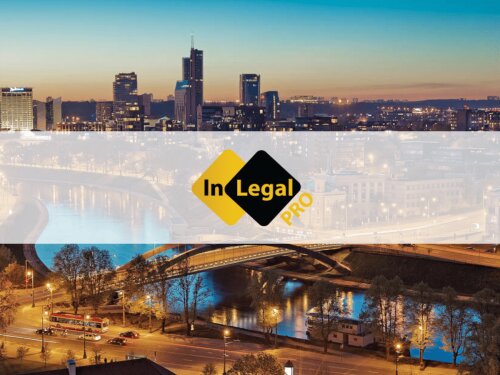Best Immigration Lawyers in Republic of Lithuania
Share your needs with us, get contacted by law firms.
Free. Takes 2 min.
Or refine your search by selecting a city:
List of the best lawyers in Republic of Lithuania
About Immigration Law in Republic of Lithuania
Immigration law in the Republic of Lithuania governs the entry, residence, and rights of foreigners in the country. It covers a wide range of issues, including visas, work permits, asylum, and citizenship. Understanding and navigating these laws can be complex, which is why many people seek legal advice to ensure they are in compliance and to protect their rights.
Why You May Need a Lawyer
There are several situations where you may need a lawyer to help you with immigration issues in Lithuania. Some common reasons include applying for a visa or residence permit, facing deportation or removal proceedings, seeking asylum, or dealing with issues related to family reunification. A lawyer can provide valuable advice, support, and representation to help you navigate the legal system and achieve the best possible outcome.
Local Laws Overview
The key aspects of local laws in Lithuania that are particularly relevant to immigration include the Residence Law, the Law on the Legal Status of Aliens, and the Law on Asylum. These laws outline the requirements for obtaining visas and residence permits, the rights and obligations of foreigners living in Lithuania, and the procedures for seeking asylum. It is important to be familiar with these laws and regulations to ensure compliance and protect your legal rights.
Frequently Asked Questions
Q: How can I apply for a visa to travel to Lithuania?
A: You can apply for a visa at a Lithuanian embassy or consulate in your country of residence. The type of visa you need will depend on the purpose of your visit, such as tourism, business, or study.
Q: What is the process for obtaining a residence permit in Lithuania?
A: To obtain a residence permit, you must meet certain requirements, such as having a valid reason for staying in Lithuania, sufficient financial means to support yourself, and a clean criminal record. You will need to submit an application to the Migration Department and attend an interview.
Q: Can I work in Lithuania as a foreigner?
A: Yes, you can work in Lithuania as a foreigner if you have a valid work permit. You will need to have a job offer from a Lithuanian employer and meet certain criteria to qualify for a work permit.
Q: What are my rights as a foreigner living in Lithuania?
A: As a foreigner living in Lithuania, you have certain rights, such as the right to work, study, and receive healthcare. You also have the right to be treated fairly and equally under the law.
Q: How can I apply for asylum in Lithuania?
A: If you are seeking asylum in Lithuania, you can submit an application to the State Border Guard Service. You will need to provide evidence of persecution in your home country and demonstrate that you meet the criteria for refugee status.
Q: Can I bring my family to live with me in Lithuania?
A: If you have a residence permit in Lithuania, you may be able to bring your family members to live with you. The conditions and requirements for family reunification depend on your individual situation and the type of residence permit you hold.
Q: What are the consequences of violating immigration laws in Lithuania?
A: Violating immigration laws in Lithuania can have serious consequences, such as fines, deportation, or being banned from entering the country in the future. It is important to comply with all laws and regulations to avoid legal problems.
Q: How can a lawyer help me with immigration issues in Lithuania?
A: A lawyer can provide legal advice, assistance with applications and paperwork, representation in court or administrative proceedings, and guidance on how to navigate the immigration system in Lithuania. They can help protect your rights and ensure that you are in compliance with the law.
Q: Can I change my immigration status in Lithuania?
A: Yes, it may be possible to change your immigration status in Lithuania under certain circumstances, such as getting married to a Lithuanian citizen, finding employment, or meeting other eligibility criteria for a different type of visa or residence permit.
Q: What is the process for obtaining Lithuanian citizenship?
A: To obtain Lithuanian citizenship, you must meet certain requirements, such as living in Lithuania for a specified period, speaking the Lithuanian language, and passing a citizenship test. The process can be complex, so it is recommended to seek legal advice to help you navigate it successfully.
Additional Resources
If you need legal advice or assistance with immigration issues in Lithuania, you can contact the Lithuanian Bar Association for a list of qualified lawyers specializing in immigration law. You can also visit the website of the Migration Department for information on visas, residence permits, and other immigration-related matters.
Next Steps
If you are facing immigration issues in Lithuania and need legal assistance, the first step is to contact a qualified immigration lawyer for a consultation. They can assess your situation, explain your options, and help you navigate the legal process effectively. Remember to provide all necessary documentation and information to your lawyer to ensure the best possible outcome for your case.
Lawzana helps you find the best lawyers and law firms in Republic of Lithuania through a curated and pre-screened list of qualified legal professionals. Our platform offers rankings and detailed profiles of attorneys and law firms, allowing you to compare based on practice areas, including Immigration, experience, and client feedback.
Each profile includes a description of the firm's areas of practice, client reviews, team members and partners, year of establishment, spoken languages, office locations, contact information, social media presence, and any published articles or resources. Most firms on our platform speak English and are experienced in both local and international legal matters.
Get a quote from top-rated law firms in Republic of Lithuania — quickly, securely, and without unnecessary hassle.
Disclaimer:
The information provided on this page is for general informational purposes only and does not constitute legal advice. While we strive to ensure the accuracy and relevance of the content, legal information may change over time, and interpretations of the law can vary. You should always consult with a qualified legal professional for advice specific to your situation.
We disclaim all liability for actions taken or not taken based on the content of this page. If you believe any information is incorrect or outdated, please contact us, and we will review and update it where appropriate.
Browse immigration law firms by service in Republic of Lithuania
Republic of Lithuania Attorneys in related practice areas.
Browse immigration law firms by city in Republic of Lithuania
Refine your search by selecting a city.











